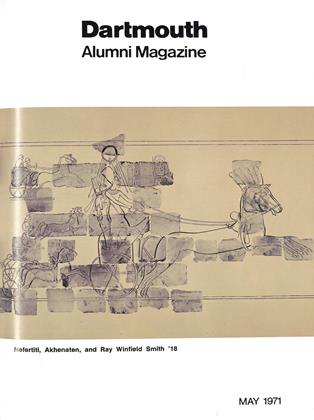By RussellEraser '47. Princeton University Press,1970. 215 pp. $7.50.
In 1577 the plague struck London. A frequent event in Tudor years, but this outbreak prompted new diagnosis. The preacher at Paul's Cross devised a breathtaking syllogism: the plague is caused by sin (that is axiomatic); the cause of sin is the theater; therefore plays occasion the plague.
The abolitionary spirit of Paul's Cross triumphed in 1642, when a Puritan Parliament outlawed the theater entirely, and even after the Stuart restoration permitted drama again to be performed, the attack continued: witness Jeremy Collier. Nor was the animus directed at drama alone. Because the stage gives physical realization to its fictions, it is more pernicious, but all literature lies.
The "war against poetry" has customarily been seen as a Puritan offensive waged on a moral battleground. Professor Fraser successfully argues a wider view. The reformer condemning fictional "manslaughter and bold bawdry" may come from any sect. His spears may be levied, with total historical unscrupulousness, from the armory of the early Fathers who besieged the gross paganism of the Roman stage; or his disgust may arise from silk costumes and transvestite boy-actors. Above all, he finds poetry idle. It offends the ardent believer: it is not truth. It offends the businessman: it is not useful or productive. It offends the nascent scientist: it is fraught with metaphor and mythology. It offends the philosophy pretty patterns of words are mere appearance. And it offends the middle class: art is a gewgaw symbolizing the conspicuous consumption of aristocratic patrons. The war on poetry discloses in the warriors attitudes energizing the modern world and tearing it from the medieval order, apotheosizing naked truth and utility.
Fraser overstates. It would appear that none but aristocrats liked poetry, and that the abyss in English dramatic talent after Congreve was dug exclusively by scientific or God-intoxicated or peer-hating utilitarians. Further, the winnowing reformer, hot to thresh out idle things, is ageless: Fraser quotes pope Gregory, "Knowing no literature, I enter into God's power." But the case is strong. Fraser exposes the springs of modern Philistinism with awful clarity.
Thus the book's import is bleak. It does not. however, read bleakly. From a mass of tracts he has dutifully perused and pondered, Fraser gives us gems of Elizabethan anecdote and polemic. His own style is keen, elegant, lapidary. Civilization may glow even in the chronicle of its own vicissitude.
Author of The Court Comedies of John Lyly, Mr. Saccio is Assistant Professor of Englishat Dartmouth College.
 View Full Issue
View Full Issue
More From This Issue
-
 Feature
FeatureNefertiti, Akhenaten, and Ray Winfield Smith '18
May 1971 By John R. Scotford Jr. '38 -
 Feature
FeatureThe Dartmouth Institute
May 1971 -
 Feature
FeatureTrustees Vote to Consider Associated School for Women
May 1971 -
 Article
ArticleThe Undergraduate Chair
May 1971 By JOEL ZYLBERBERG '72 -
 Article
ArticleFaculty
May 1971 By WILLIAM R. MEYER -
 Article
ArticleHanover's Famous May "Murder"
May 1971
PETER SACCIO
Books
-
 Books
BooksEDITOR'S PICKS
NOVEMBER | DECEMBER 2013 -
 Books
BooksRAYMOND OF THE TIMES
October 1951 By Arthur M. Wilson -
 Books
BooksThe Ku Klux Klan
June 1924 By Erville B. Woods. -
 Books
BooksROBERT FROST A BIBLIOGRAPHY
May 1937 By Harold G. Rugg '06 -
 Books
BooksPRIVATE.
DECEMBER 1970 By HENRY B. WILLIAMS -
 Books
BooksTHE STORY OF NEW ENGLAND,
January 1942 By Herbert F. West '22.




